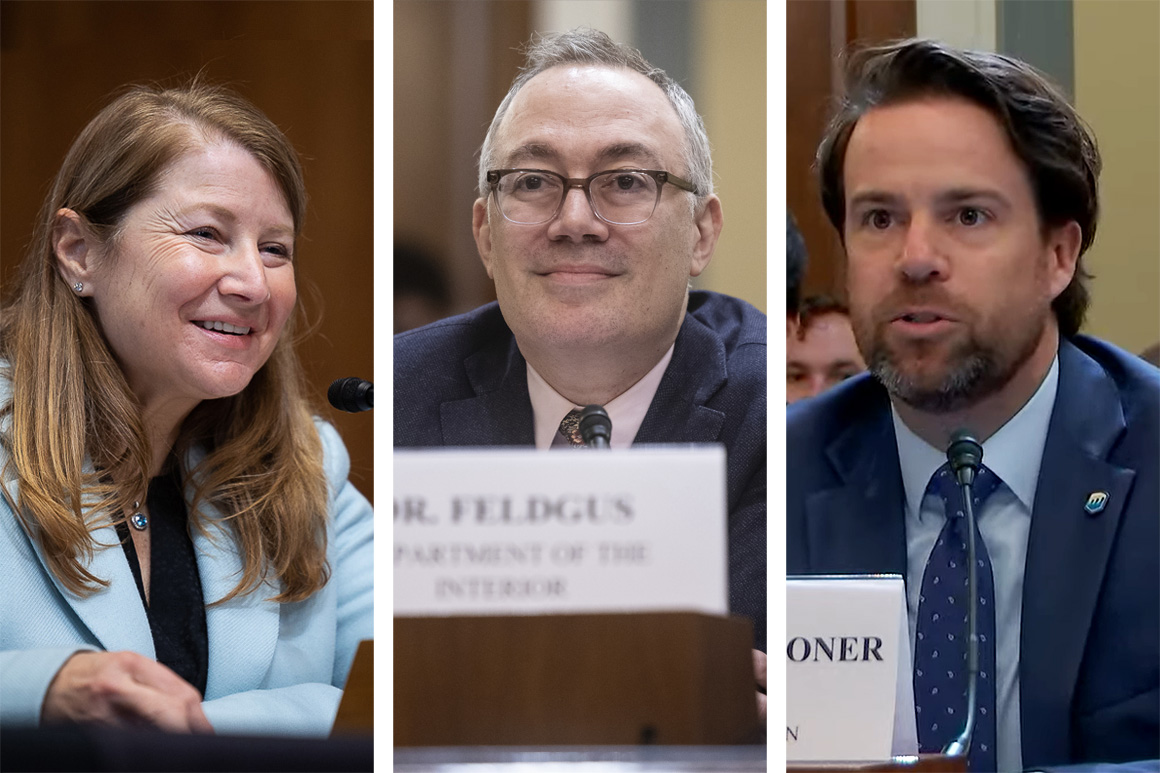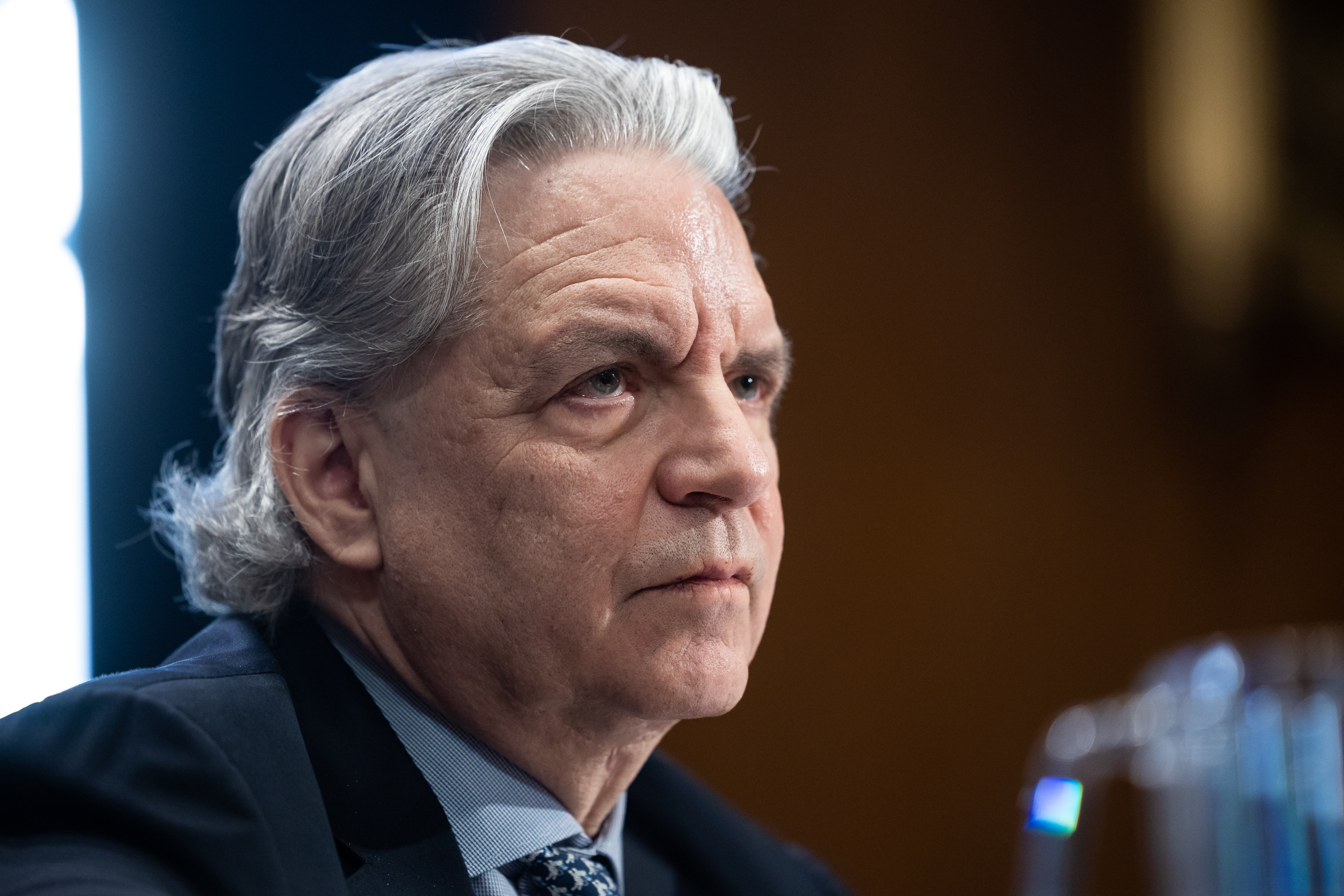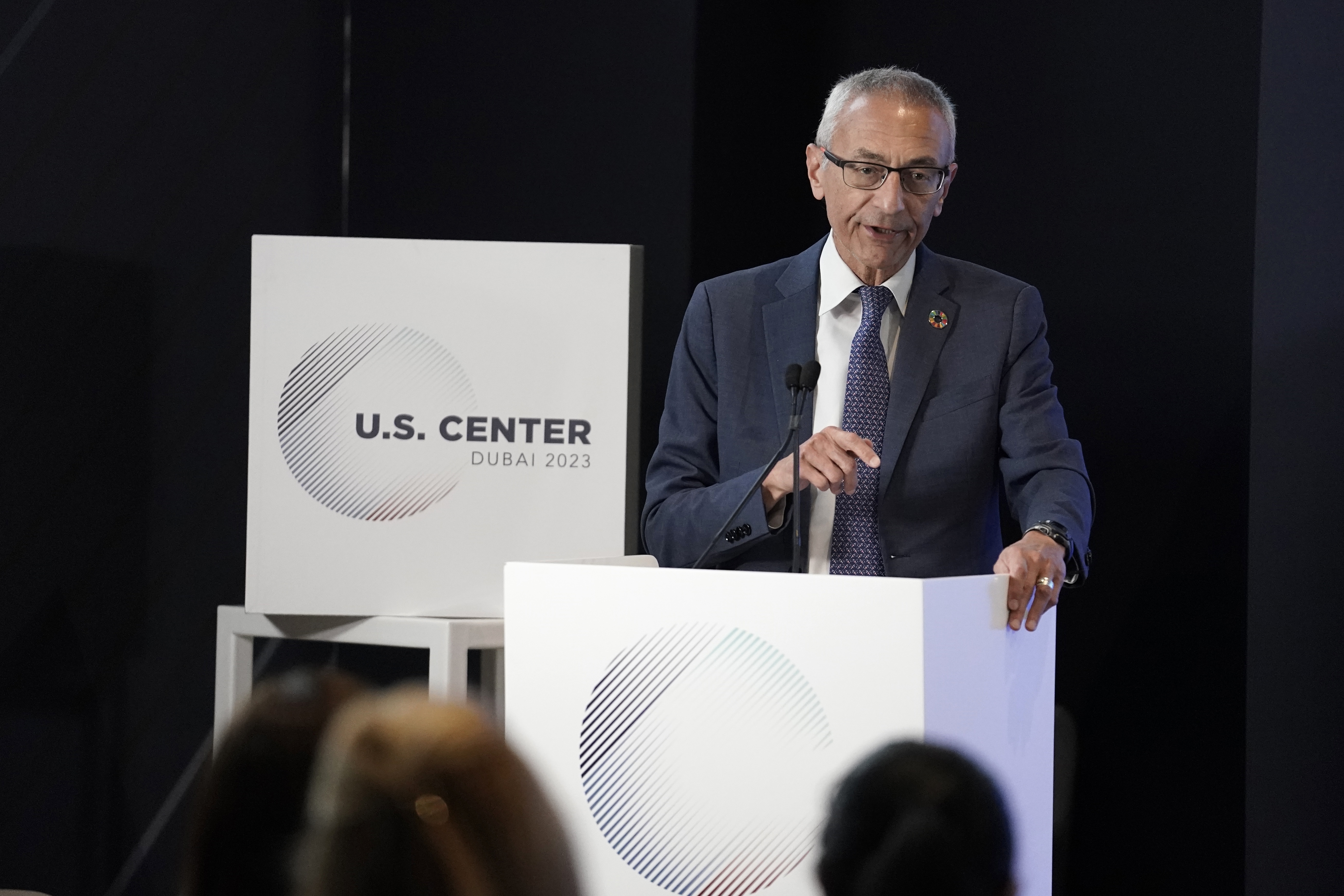President Joe Biden is shuffling senior aides and packing top climate and energy posts with temporary officials in the waning days of his term.
Climate envoy John Kerry’s job is getting wrapped into White House official John Podesta’s existing portfolio. The second-in-command at the Interior Department left last year, and the White House hasn’t nominated a replacement. An acting official is stepping in at EPA to take over for the agency’s top water regulator.
Those and other recent appointments by the Biden administration mean some key jobs critical to the president’s energy and climate agenda are now held by placeholders rather than Senate-confirmed officials. The administration and its allies insist Biden’s policy agenda is in good hands even without leaders given the Senate stamp of approval, but the staff shuffles are frustrating some lawmakers who see the moves as efforts to circumvent congressional oversight.
Democrats’ razor-thin majority in the Senate creates a “roadblock” to the confirmation process, said David Hayes, a former Biden White House official who served as Interior’s deputy secretary during the Obama and Clinton administrations.
“Any objection by any Republican creates a huge lift to overcome to get a confirmation,” said Hayes.
Filling senior jobs with acting officials has become standard fare late in a presidential term, when political infighting intensifies the already polarized process of pushing nominees through the confirmation process.
“This is a trend we’re seeing across the government,” said Liz Hempowicz, vice president of policy and government affairs at Project on Government Oversight.
And as election-year politics heat up, virtually no one expects vacancies in high-profile energy and environment jobs to get filled by Senate-confirmed officials.
“The reality is that the Senate is not in session all that much between now and the election,” said Jim Manley, a strategist and former Senate Democratic leadership aide. “If you are not a judicial nominee, the window for you to be confirmed before the start of the August recess is slowly but surely closing.”
The Biden administration says personnel shifts won’t hinder the team’s work on energy and environment.
“Over the last three years, we have assembled a top-tier team that is delivering on President Biden’s historic climate and environmental agenda, which is lowering energy costs for hardworking families, ensuring clean air and clean water for all our children, and creating good-paying jobs in every community across the country,” White House spokesperson Sam Michel said in a statement. “We’ve delivered tremendous progress, moving at an unprecedented speed — make no mistake, our team will continue to take action to achieve the President’s ambitious climate goals and protect the future for generations to come.”
Musical chairs at agencies

In the wake of recent high-level departures, the Biden administration has shifted personnel in energy and environment agencies like EPA and Interior, as well as some of the most prominent climate positions.
In January, the White House announced it would hand the portfolio of outgoing climate envoy Kerry to Democratic political strategist and energy expert Podesta. Shifting the responsibilities to Podesta, who will remain an aide in the White House, riled Republicans, who as of 2023 made envoys subject to Senate confirmation. Kerry’s current team will report to Rich Verma, the deputy secretary of State for management and resources.
Biden has installed temporary officials into other critical posts across the government.
At Interior, the administration appointed Laura Daniel-Davis as acting deputy secretary last October following the resignation of Tommy Beaudreau. Daniel-Davis’ appointment came after she failed to win Senate confirmation for a different Interior Department job, and she now holds a position often characterized as the day-to-day manager of the sprawling department.
Biden hasn’t officially nominated Daniel-Davis or anyone else to serve as Interior’s deputy, and it’s certain that any nomination for that job would turn into a contentious Senate fight over the administration’s energy policies.
Backfilling Daniel-Davis’ former post is Steve Feldgus, who was promoted to the position of principal deputy assistant secretary for land and minerals management. That office has been without a Senate-confirmed leader since former President Donald Trump’s Assistant Secretary Joe Balash resigned in 2019.
On water policy, including the ongoing negotiations over the Colorado River, former Bureau of Reclamation Deputy Commissioner Michael Brain has taken over as principal deputy assistant secretary for water and science. He fills a role previously played by Tanya Trujillo, who was the confirmed assistant secretary until she left Interior last year.
Biden also tapped Sharon Buccino, a former environmental attorney who worked for decades at the Natural Resources Defense Council, to lead the Office of Surface Mining Reclamation and Enforcement. The small office, tasked with cleaning up abandoned mines and overseeing mine plans, has been without a Senate-confirmed leader since the end of the Trump administration. Biden hasn’t formally nominated anyone since he took office.
An Interior spokesperson declined to comment for this story.
Another high-level vacancy has cropped up in EPA’s water office.
Upon the departure of Radhika Fox, the agency’s top water official, Biden tapped the office’s second-in-command, Bruno Pigott, to fill the role on an acting basis.
“Under President Biden’s leadership, the United States is making historic investments in drinking water and clean water infrastructure upgrades,” EPA spokesperson Remmington Belford said in an email, pointing to a $5.8 billion water infrastructure announcement made this week by Vice President Kamala Harris and EPA Administrator Michael Regan.
“The EPA’s Office of Water plays a critical role in this work and will continue to deliver on the Administration’s historic commitment to ensuring clean water for all Americans,” Belford said.
EPA’s solid waste office hasn’t had a Senate-confirmed leader since the Trump administration after the Senate failed to advance Biden’s nominee for the job. Barry Breen, a longtime career official, is leading the office in an acting capacity.
At the Department of Energy, Jeff Marootian is serving as principal deputy assistant secretary for energy efficiency and renewable energy, a position that does not require Senate confirmation. The White House late last year withdrew Marootian’s nomination to lead the office after Sen. Joe Manchin (D-W.Va.) stalled the confirmation process, citing opposition to DOE’s planned regulation of gas stoves.
DOE spokesperson Amanda Finney said the administration has jump-started a historic clean energy transition and DOE’s workforce is ensuring the transition benefits all Americans.
“Under the leadership of President Biden and [Energy] Secretary [Jennifer] Granholm, the Department of Energy is working across the country to unleash the incredible potential of clean energy in America and ensure our economic and national security as we continue to implement the energy investments in the President’s Investing in America agenda and make this a stronger, more prosperous nation,” said Finney.
Confirmation limbo

The temporary appointments and reshuffling come as federal agencies scramble to finish Biden’s rules — and protect his legacy from rollbacks should Trump win the presidency.
Jenny Mattingley, vice president of government affairs at the Partnership for Public Service, said political appointees typically only stay in office between 18 to 24 months, and it’s not uncommon to see departures at the end of an administration. It’s also par for the course to see a president tap career officials or bring in new political appointees to avoid vacancies, Mattingley added.
“It’s typically fairly common that there are acting officials in place, just given how long it takes for the Senate confirmation process to work,” she said.
Mattingley said the maneuver is partly in response to an increasingly difficult Senate confirmation process, noting that it’s taken an average of 172 days under Biden to get individuals confirmed, compared to just 84 days under the George W. Bush administration.
“In each successive administration, we’ve seen that average number of days go up,” she said.
Stan Meiburg, who served as EPA’s acting deputy administrator during the Obama administration, knew when he started the job that it was unlikely his nomination would be approved by Congress.
“It didn’t seem like the Republicans in the Senate were confirming anybody at that point,” Meiburg told E&E News in a recent interview. Obama nominated Meiburg for the job in January 2015, but Meiburg was never confirmed. He held the post in an acting capacity through the end of the Obama administration in early 2017.
“I never felt that there was any difference at all,” Meiburg said. “I felt like I had all the authority I needed.” He had spent more than three decades working at EPA before he came back as acting deputy, Meiburg said. Someone who stepped into an acting role without much experience on the job “would have a much harder time,” he said.
Confirmation delays are occurring under Biden, too.
Biden’s pick to lead EPA’s air office, Joe Goffman, was just confirmed by the Senate in January, nearly two years after he was first nominated.
Biden has seen much less churn in Cabinet personnel when compared to the Trump administration. And Biden’s Cabinet current members last year committed to sticking it out through the reelection season, NBC reported in September.
The Labor Department serves as a cautionary tale for officials considering departures.
Former Labor Secretary Marty Walsh resigned in early 2023, and Biden nominated Deputy Labor Secretary Julie Su to take over, but her nomination has languished in the Senate. Although a committee Tuesday voted 11-10 to send Su’s nomination to the floor — the second time she’s narrowly received the panel’s backing — she is still expected to face ardent opposition before the full Senate. Meanwhile, Su has been leading the department in an acting capacity.
Congressional angst

Congressional Republicans see some of Biden’s appointments as efforts to circumvent their oversight responsibilities.
“In non-confirmed positions, both Mr. Kerry and Mr. Podesta have led the Biden administration’s efforts to put the interests of environmental activists over the interests of the American people and our allies,” West Virginia Sen. Shelley Moore Capito, the top Republican on the Environment and Public Works Committee, said in a statement.
“Unfortunately, President Biden’s anti-American energy agenda will likely continue on, regardless of who occupies unaccountable climate offices.”
Senate Energy and Natural Resources ranking member John Barrasso (R-Wyo.) likewise blasted the Biden administration’s handling of the confirmation process. Republicans, he said, would give the president’s candidates “prompt and fair consideration” if they were supportive of all forms of U.S. energy.
“President Biden’s devotion to a radical, anti-American energy agenda is the reason so many of his nominees can’t win confirmation votes,” Barrasso said in a statement. “Despite their failure to win Senate confirmation, President Biden continues to put these extremists in power by having them serve as acting Department officials. This way they can continue their attack on American energy production on federal lands and waters.”
Senate Environment and Public Works Chair Tom Carper (D-Del.) takes his committee’s role in the nominations process very seriously, he said in a statement.
“I am proud of the work we’ve done to confirm the vast majority of the Presidentially-nominated and Senate-confirmed leaders at the agencies that are responsible for helping us meet our climate goals and speed the deployment of clean energy,” Carper said. “Under President Biden’s leadership, the administration has made the largest investment in climate in U.S. history. I’m looking forward to continuing to work with the administration and my colleagues to fill the few remaining vacancies.”
Other Democrats like Manchin, chair of the Senate Energy and Natural Resources Committee, have criticized the administration for maneuvers like changing Podesta’s title without first seeking congressional approval. “I am disappointed this administration has attempted to avoid seeking the advice and consent of this Senate by changing the title of their climate envoy,” Manchin said at a hearing earlier this month.
Hempowicz with the Project on Government Oversight said appointments — as opposed to nominations and confirmations — are cropping up across the federal footprint as Biden puts his choice picks in place and pivots to avoid time-consuming and difficult confirmation battles.
The same practice was used by the Trump and Obama administrations, and occurs because presidents want to avoid bruising Senate confirmations that can be challenging and time-consuming, she said.
“There’s supposed to be a little bit more delicate balance between the executive branch prerogatives and Congress’ prerogatives, particularly when we’re talking about Senate-confirmed positions,” said Hempowicz. “We’ve seen the executive branch kind of glom on to and jealously guard their prerogatives.”
But moving quickly to fill critical spots, Hempowicz warned, shouldn’t undercut the necessary and constitutionally mandated oversight role that Congress must play.
“Expediency is, I know, top of mind for the administration, but it can’t be at the expense of the Senate playing its proper role in giving their advice and consent,” said Hempowicz.
Mattingley said that administrations are trying to avoid vacancies — not congressional oversight.
“Having acting [individuals] is preferable to having a vacancy there, in terms of from the administration standpoint, because it gives them their point people in each of these leadership roles,” she said.
